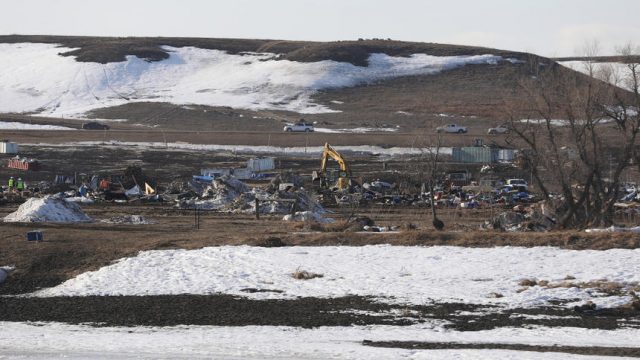Read It: Federal Judge Eviscerates Tribal Request to Halt Dakota Access Pipeline Construction on Religious Grounds

Authorities clear the Oceti Sakowin camp in Cannon Ball, North Dakota, U.S., February 24, 2017. REUTERS/Stephen Yang
By now I’m sure you’ve all heard the news that Federal Judge James Boasberg has, once again, rejected a request made by activist lawyers on behalf of Sioux tribes to halt access of the Dakota Access Pipeline.
This comes amid news that the pipeline itself is nearly complete and could see oil flowing through it within days. I can’t help but feel that this decision today, while not necessarily concluding the legal wrangling around the pipeline, is the last nail in the coffin for the opposition.
You can read all of Boasberg’s ruling below. The filings in this matter have gotten a bit confusing, so keep in mind that this is in response to the Cheyenne River Sioux tribe’s request for an injunction on the grounds that the Dakota Access Pipeline is an affront to their religious rights. The other suit, filed by the Standing Rock Sioux Tribe, is based on the idea that construction of the pipeline would harm historic places and artifacts along its route.
That one is still pending, though its success seems extremely unlikely at this point.
The Cheyenne River suit says the pipeline going under the Lake Oahe reservoir would contaminate the water they use for religious ceremonies (even if it doesn’t leak), and that the pipeline itself is the fulfillment of a Lakota prophecy about a “black snake” which would harm the Sioux people.
Judge Boasberg, in rejecting the request for an injunction, makes absolute mincemeat of this argument noting a) that there’s already a natural gas pipeline crossing Lake Oahe in this same area b) there are already oil pipelines under the Missouri River upstream from Lake Oahe and c) the Lake Oahe reservoir itself can hardly be part of some ancient Lakota prophecy given that it’s man-made and, you know, about 60 years old.
This from page 21 of the opinion:
It is incumbent upon the government and industry to respect the history and culture of our nation’s indigenous peoples. But for that history and culture to be invoked in a manner which is transparently cynical and calculated undermines our ability to do so.
Here’s the full opinion:
[scribd id=341209006 key=key-waeN9cIZSTlsRiXNVJmp mode=scroll]





